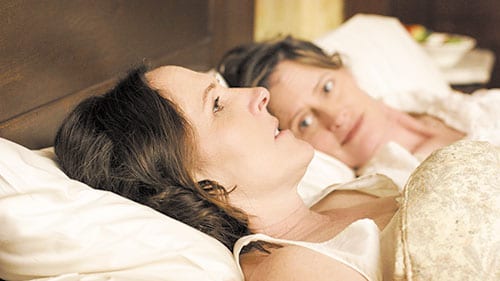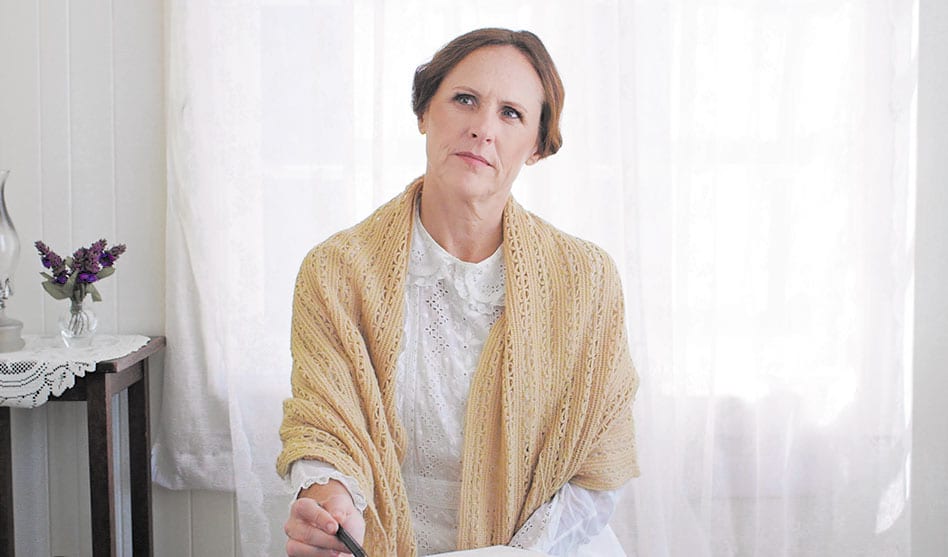‘SNL’ alum Molly Shannon and Madeleine Olnek wax poetic about a ‘forgotten’ queer icon
It’s a cliché that great dramatic actors often bomb at comedy, but that great comic actors often excel at drama. And clichés are clichés because they are often true. Even so, one of the most surprising actresses to emerge from comedy to critical acclaim is Molly Shannon. A staple on Saturday Night Live for six seasons famed for her hyperbolic characters (from an irrepressible Debbie Reynolds to pit-sniffing schoolgirl Mary Katherine Gallagher), she even got an Emmy nomination as a sociopath hilariously stalking Debra Messing season after season on Will & Grace.
But starting with 2016’s Other People (in which she played the dying mother of a gay son), she began to establish her bona fides as an actress of sly versatility — poignantly real, even when appearing in quirky comedies. She doubles down with her latest film, Wild Nights with Emily, writer-director Madeleine Olnek’s queer revision of the image of 19th century poet Emily Dickinson (Shannon) as a reclusive, sexless spinster. Here, Emily is shown as a modern gay woman confined by the strictures of society — a victim of the dominant patriarchy but a fully-formed human being nonetheless.
We chatted with Shannon and Olnek about their long-standing friendship, their commitment to telling gay stories and why it took so long for the film to get a release.
— Arnold Wayne Jones
Dallas Voice: Madeleine, Wild Nights with Emily actually premiered at SXSW…. in 2018. What took so long for you to get a theatrical release? Madeleine Olnek: For me the festival circuit was very important [to the success of the theatrical release of the film]. No one knew this information at all, and we had to take time to lay the groundwork — we were ahead of our time, and now more people are on board talking and thinking about Emily Dickinson in this new way. We needed the time to build a groundswell. The Emily Dickinson Museum showed it on the lawn of the house where she grew up — they had never shown a movie there before.
Molly, do you remember your first job? Molly Shannon: I do! I got a part in a movie called Phantom of the Opera opposite Robert Englund. The director was Dwight Little, who was from my hometown of Cleveland. We shot in Budapest! I was working as a food girl, handing out samples of liver paté. I would hand one to [customers] and they would ask, so what do you do for a living? And I would say I’m an actress. They would [roll their eyes] and say, “Yeah, right … good luck with that…” But I would say, “No. I’m actually going to Budapest to film a movie!” My friend, Jill Schoelen, was my costar, and at the time she was dating an unknown actor — some newcomer named Brad Pitt. I was like “yeah, he’s cute.” How funny is that?

Shannon considers Emily Dickinson a queer trailblazer.
Molly, you’ve done several dramatic roles lately — do you feel comfortable in both, because you’re so famous for your comedy? MS: When I started out, I was just a regular drama student. Madeleine and I met at NYU drama school.
Do you have a difference in your approach to drama and comedy? MS: I would say it is definitely the same — I always play the emotional truth of a character [whether in drama or comedy], because it gives comedy more depth. I still play it from my heart. I don’t like it when people make fun of [their characters] — as if comedy doesn’t matter.
What was your introduction to comedy then? MS: Madeleine directed and wrote this show at NYU, which was produced by Dan Jinks [now an Academy Award-winning producer responsible for American Beauty and Milk], that was a comedy show. I was in rehearsals for that when I created Mary Catherine Gallagher. That was my real introduction to comedy, when I realized [I had a talent for it]. People were like “you should be on SNL!”
MO: There were lines around the block for that show. Dan Jinks says that show convinced him that he should be a producer, but the truth is it was Molly — everyone was in line for Molly. It was like this comedy tornado when she came onstage — the air was electric, and we all knew we were witnessing [something special]. The other person I cast was Adam Sandler, who I scouted. I felt Adam was feeling uncomfortable onstage, and I went to her and said why don’t you take Adam out for coffee so he feels more comfortable — he would probably [react better to you than to me as the writer-director] …
MS: And I was like, I don’t think he needs my help! Clearly that proved very true. She has a good eye. Adam helped me get on SNL. He told Lorne about me. And we are still good friends.
Molly, aside from the prior connection, what drew you to this project? MS: Madeleine is a one-of-a-kind super talent… you don’t meet many women like Madeleine in Hollywood. She sent me all this stuff about Emily Dickinson and what she wanted to do [with the material]. She was so passionate about it. [It was] a special opportunity, but I have two kids [ages 14 and 15], so I didn’t want to fly out to New York to film, but she was so accommodating.
Molly, you’ve done lots of queer films and TV — you’ve always been a vocal ally. Is it important to you to tell those stories? MS: It really is very important to me. It’s certainly no accident. It’s important to get these stories out. And I think telling the truth about Emily [is one of those. The popular conception of her] is as a victim or someone who had no desire to have her voice heard [but that wasn’t true]. It sabotages her status as a true LGBTQ hero. She was a trailblazer, a fearless woman who is a model for the new wave of feminism that advocates equality for all. We need to tell this story now — they want to be heard …this kind of sanitized version of her life was more digestible to people in the past. I’m not sure why.
MO: Molly said it perfectly. But I want to add: The film quotes Emily’s poems extensively. It is rated PG-13 — you can take your kids to it and your parents. It’s been really well-received — beautiful poetry and beautiful costumes? It’s homoerotic entertainment for the entire family.












